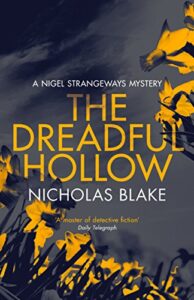The Dreadful Hollow by Nicholas Blake
Review by Matt B. (BuffaloSavage)
Poison pen letters figure largely in Dorothy Sayers’ novel Gaudy Night, Agatha Christie’s The Moving Finger and John Dickson Carr’s Night at the Mocking Widow. Ditto for The Dreadful Hollow (1953). Someone is sending abusive missives in the small Dorset village of Prior’s Umborne. One of the recipients has committed suicide, another has attempted it, and yet another has had a nervous breakdown.
Not only has the tranquility of the quiet village been disturbed by the letters, but the wheels of the factory, the main employer in town, are moving more slowly too. This enrages the imperious owner Sir Archibald Blick. He hires private detective Nigel Strangeways to identify the mean epistle writing culprit. Strangeways gently questions a variety of characters in the cozy village settings of the post office, the Sweet Drop pub and inn, the vicarage and Little Manor, the home of the thirty-something sisters Celandine and Rosebay Chantemerle.
Celandine is a cornflower-blue-eyed blonde, full of vivacious charm, but wheelchair-bound. She has suffered hysterical paralysis ever since she discovered the corpse of her father in a quarry. Rosebay is younger and auburn-haired. Like her red-haired sisters, she’s a passionate soul, which means she’s a blast when she’s feeling good but a thunderstorm when she’s feeling bad. Dinny has kind of a past with Charles Blick, a son of Sir Archibald, while Bay has a present with him.
Nigel Strangeways depends on his insight, phenomenal memory, and deadpan manner in his investigations. His foil is Scotland Yard’s Inspector Blount, down to earth, candid, and tough. In the first half, the focus of the story is always on the anonymous letters. A religious manic-depressive adds to the climate of anxiety in this novel. So the setting is cozy, but the tone is decidedly rattled, though not on the same desperate pitch as the relentless The Beast Must Die.
Cecil Day Lewis, English poet and novelist, used the pen name Nicholas Blake for seventeen mystery novels starring this series detective. His characters and settings are always well-defined, even if the detecting side is sometimes too easy. The writing is highly intelligent and articulate without being overly intellectual. Day Lewis was a classicist so the plots have an undercurrent of Greek tragedy: mistakes come out of impulse, tormented personalities cause a lot of fussing and fighting.


